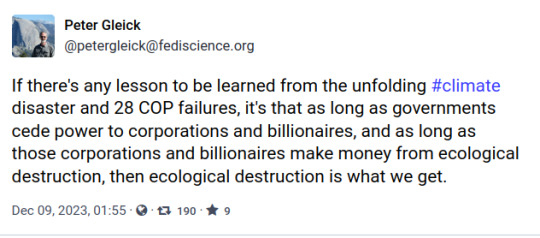#Climate Change Conference
Text
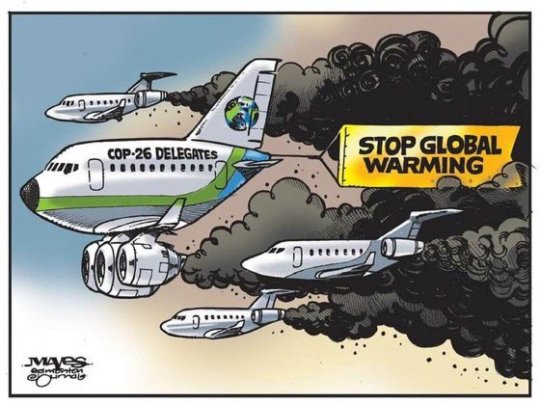

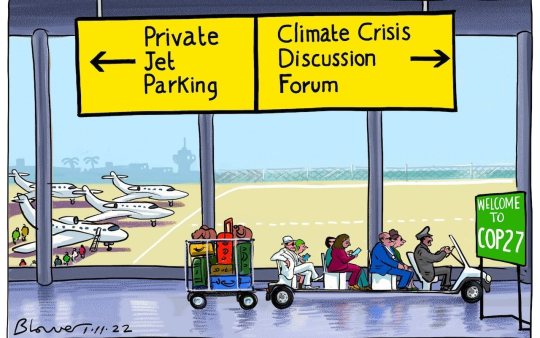
COP27: World Climate Waste of Time
The climate changes, politicians do not.
l (x)(x)(x) l title & quote fr. AGO (2nd art)
#cop27#art#cartoons#climate change#united nations#un#egypt#cartoon#global warming#environment#planets#earth#climate crisis#climate change conference#private jet
205 notes
·
View notes
Photo
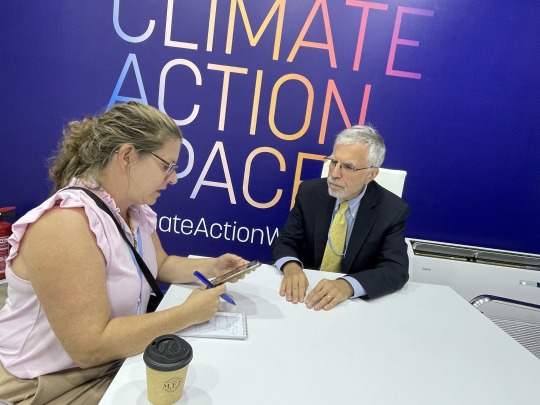
Professor Stavins meeting with Lisa Friedman, climate change reporter at the New York Times, at COP27 in Sharm El Sheikh, Egypt, November 16, 2022.
#COP27#COP 27#Climate Change Conference#ClimateChangeConference#climate policy initiative#GlobalClimateTalks#UN Climate Talks
0 notes
Text
Tiny Pacific islands wants an international court opinion on responsibility for the climate crisis
Tiny Pacific islands wants an international court opinion on responsibility for the climate crisis
Small island states are losing their patience with big polluting nations as they suffer the devastating impacts of climate change.
Without significant movement at the forthcoming COP27 climate talks in Egypt, a pivotal vote at the next UN general assembly meeting, brought by the tiny Pacific islands of Vanuatu, could open the floodgates to international climate litigation.
A core group of 16…

View On WordPress
1 note
·
View note
Text

Saudi Arabia, the world’s leading exporter of oil, has become the biggest obstacle to an agreement at the United Nations climate summit in Dubai, where countries are debating whether to call for a phaseout of fossil fuels in order to fight global warming, negotiators and other officials said.
The Saudi delegation has flatly opposed any language in a deal that would even mention fossil fuels — the oil, gas and coal that, when burned, create emissions that are dangerously heating the planet. Saudi negotiators have also objected to a provision, endorsed by at least 118 countries, aimed at tripling global renewable energy capacity by 2030.
Saudi diplomats have been particularly skillful at blocking discussions and slowing the talks, according to interviews with a dozen people who have been inside closed-door negotiations. Tactics include inserting words into draft agreements that are considered poison pills by other countries; slow-walking a provision meant to help vulnerable countries adapt to climate change; staging a walkout in a side meeting; and refusing to sit down with negotiators pressing for a phaseout of fossil fuels.
The Saudi opposition is significant because U.N. rules require that any agreement forged at the climate summit be unanimously endorsed. Any one of the 198 participating nations can thwart a deal.
Saudi Arabia isn’t the only country raising concerns about more ambitious global efforts to fight climate change. The United States has sought to inject caveats into the fossil fuel phaseout language. India and China have opposed language that would single out coal, the most polluting of fossil fuels.
…Saudi Arabia has stood out as the most implacable opponent of any agreement on fossil fuels.
“Most countries vary on the degree or speed of how fast you get out of fossil fuels,” said Linda Kalcher, a former climate adviser to the United Nations who has been in negotiating rooms this week. Saudi Arabia, she said, “doesn’t even want to have the conversation.”
Saudi officials did not respond to requests for comment.
(continue reading)
#politics#cop28#climate change#global warming#climate crisis#saudi arabia#eau#environment#fossil fuels#un climate summit#united nations#united nations climate change conference#environmental activism
192 notes
·
View notes
Photo

UN climate change conference locations since 2001 .
by Maps_interlude
66 notes
·
View notes
Text
The world isn’t on track to meet its climate goals — and it’s the public’s fault, a leading oil company CEO told journalists.
Exxon Mobil Corp. CEO Darren Woods told editors from Fortune that the world has “waited too long” to begin investing in a broader suite of technologies to slow planetary heating.
That heating is largely caused by the burning of fossil fuels, and much of the current impacts of that combustion — rising temperatures, extreme weather — were predicted by Exxon scientists almost half a century ago.
The company’s 1970s and 1980s projections were “at least as skillful as, those of independent academic and government models,” according to a 2023 Harvard study.
Since taking over from former CEO Rex Tillerson, Woods has walked a tightrope between acknowledging the critical problem of climate change — as well as the role of fossil fuels in helping drive it — while insisting fossil fuels must also provide the solution.
In comments before last year’s United Nations Climate Conference (COP28), Woods made a forceful case for carbon capture and storage, a technology in which the planet-heating chemicals released by burning fossil fuels are collected and stored underground.
“While renewable energy is essential to help the world achieve net zero, it is not sufficient,” he said. “Wind and solar alone can’t solve emissions in the industrial sectors that are at the heart of a modern society.”
International experts agree with the idea in the broadest strokes.
Carbon capture marks an essential component of the transition to “net zero,” in which no new chemicals like carbon dioxide or methane reach — and heat — the atmosphere, according to a report by International Energy Agency (IEA) last year.
But the remaining question is how much carbon capture will be needed, which depends on the future role of fossil fuels.
While this technology is feasible, it is very expensive — particularly in a paradigm in which new renewables already outcompete fossil fuels on price.
And the fossil fuel industry hasn’t been spending money on developing carbon capture technology, IEA head Fatih Birol wrote last year on X, the platform formerly known as Twitter.
To be part of a climate solution, Birol added, the fossil fuel industry must “let go of the illusion that implausibly large amounts of carbon capture are the solution.”
He noted that capturing and storing current fossil fuel emissions would require a thousand-fold leap in annual investment from $4 billion in 2022 to $3.5 trillion.
In his comments Tuesday, Woods argued the “dirty secret” is that customers weren’t willing to pay for the added cost of cleaner fossil fuels.
Referring to carbon capture, Woods said Exxon has “tabled proposals” with governments “to get out there and start down this path using existing technology.”
“People can’t afford it, and governments around the world rightly know that their constituents will have real concerns,” he added. “So we’ve got to find a way to get the cost down to grow the utility of the solution, and make it more available and more affordable, so that you can begin the [clean energy] transition.”
For example, he said Exxon “could, today, make sustainable aviation fuel for the airline business. But the airline companies can’t afford to pay.”
Woods blamed “activists” for trying to exclude the fossil fuel industry from the fight to slow rising temperatures, even though the sector is “the industry that has the most capacity and the highest potential for helping with some of the technologies.”
That is an increasingly controversial argument. Across the world, wind and solar plants with giant attached batteries are outcompeting gas plants, though battery life still needs to be longer to make renewable power truly dispatchable.
Carbon capture is “an answer in search of a question,” Gregory Nemet, a public policy professor at the University of Wisconsin, told The Hill last year.
“If your question is what to do about climate change, your answer is one thing,” he said — likely a massive buildout in solar, wind and batteries.
But for fossil fuel companies asking “‘What is the role for natural gas in a carbon-constrained world?’ — well, maybe carbon capture has to be part of your answer.”
In the background of Woods’s comments about customers’ unwillingness to pay for cleaner fossil fuels is a bigger debate over price in general.
This spring, the Securities and Exchange Commission (SEC) will release its finalized rule on companies’ climate disclosures.
That much-anticipated rule will weigh in on the key question of whose responsibility it is to account for emissions — the customer who burns them (Scope II), or the fossil fuel company that produces them (Scope III).
Exxon has long argued for Scope II, based on the idea that it provides a product and is not responsible for how customers use it.
Last week, Reuters reported that the SEC would likely drop Scope III, a positive development for the companies.
Woods argued last year that SEC Scope III rules would cause Exxon to produce less fossil fuels — which he said would perversely raise global emissions, as its products were replaced by dirtier production elsewhere.
This broad idea — that fossil fuels use can only be cleaned up on the “demand side” — is one some economists dispute.
For the U.S. to decarbonize in an orderly fashion, “restrictive supply-side policies that curtail fossil fuel extraction and support workers and communities must play a role,” Rutgers University economists Mark Paul and Lina Moe wrote last year.
Without concrete moves to plan for a reduction in the fossil fuel supply, “the end of fossil fuels will be a chaotic collapse where workers, communities, and the environment suffer,” they added.
But Woods’s comments Tuesday doubled down on the claim that the energy transition will succeed only when end-users pay the price.
“People who are generating the emissions need to be aware of [it] and pay the price,” Woods said. “That’s ultimately how you solve the problem.”
#us politics#news#the hill#2024#carbon emissions#green energy#climate change#climate crisis#exxon mobil#Darren Woods#United Nations Climate Conference#COP28#carbon capture and storage#renewable energy#International Energy Agency#Fatih Birol#fossil fuels#Securities and Exchange Commission#emissions
20 notes
·
View notes
Text
youtube
In 2023, the inaugural Solarpunk Conference was held in virtual space, bringing together over 150 attendees, 18 presenters, and creating a palpable sense of the solarpunk community. This episode, Ariel chats with conference organizers Charles Valsechi, Lindsay Jane, and Kees Schuller about the genesis of the conference, the inspiration for its theme, as well as a little preview of what they are hoping to see at the 2024 Solarpunk Conference: Rays of Resilience.
You can go to https://www.solarpunkconference.com/ to check out The Solarpunk Conference, access The Solarpunk Conference Journal, and buy tickets. You can also check out the channel @solarpunkconference on YouTube for recordings of last year’s presentations, and stop by Lindsay Jane's channel @TheSolarpunkScene for more solarpunky content!
#Solarpunk presents podcast#solarpunk#The Solarpunk Conference#conference#academia#non-academic#virtual conferencing#solarpunk presentations#creating solarpunk community#what kind of presentations are at the solarpunk conference#the solarpunk conference#how to apply to the solarpunk conference#what is a solarpunk conference#Lindsay Jane#Charles Valsechi#Kees Schuller#non-academic conferences#climate justice#climate change#social justice#environmentalism#activism#Youtube
11 notes
·
View notes
Text
Lessons from a Global Ecological Restoration Conference
I know this is not the usual thing I post on here, but I wanted to gather my thoughts in a place I know that I'll check in the future. I hope that this is somehow useful for others and provides insight to work in this field.
1. Ecologists do have hope for the environment!
If there's one main takeaway I've had so far, it's that people working to restore and protect our natural habitats is that they have passion and a deep hope that their efforts will make a difference.
This field is full of so many challenges when it comes to funding and politics, so it was inspiring to see that despite present barriers people from all over the world are trying their hardest to make things change for the better.
2. This conference has set a precedent towards integrating and including the input from Indigenous and First Nations peoples internationally
The entire theme of the conference was to center and uplift voices of Indigenous people from around the globe who are working in habitat and ecocultural restoration.
This is exciting! Many countries do not have formal systems in place to allow Indigenous voices to be major informants and decision makers on projects that occur on their land. It has been and will always be important to include those who are traditional stewards of the land when considering any sort of restoration or land management decisions.
I cannot be sure what the results of this initiative will be. It is a small step in the right direction though and I hope that this conference created opportunities for connections, lessons, and more conversations in the future.
We all have a part to play in recognizing the First Nations Peoples who inhabit or inhabited our land in the past (this goes without saying that this applies internationally) and working toward a future that creates proper access to funding, land, recognition, reparations, and true reciprocity for Indigenous and First Nations Peoples.
If you have not yet invested time in learning, now is a better time than ever. Research your area, connect with community, and raise your voice to make a difference.
3. Collaboration is Key
Most talks I went to and projects I read about lived and died by their ability to collaborate with a diverse group of people who have stakes in each restoration project.
It works best when implemented early, if all groups are equally represented at all levels of decision making, and if factors like environmental outcomes and the human/social dimensions of planning are considered first before the financial.
The most successful projects in ecosystem restoration were only possible due to connections that spanned industries, cultures, generations, and modes of work.
If we want our planet to thrive we need to be willing to have everyone in the room so as many people as possible can have a hand in creating a better future.
4. Things are still an uphill battle
While many of the presentations I witnessed were hopeful and fulfilling, perhaps just as many lacked a positive or negative conclusion that could wrap everything in a neat bow. Navigating government systems, changing climates, barriers to accessible and affordable resources for restoration etc. are all things that impacted various projects discussed this week.
It's also without saying that governments themselves, the policies they hold, and the rates they pass legislation will always create a delay in working towards restoration of our environment in order to prevent further harm and degradation. This of course goes for most policy making (though I suppose it depends on the country).
Climate change still presents unprecedented challenges and will impact all aspects of our livelihoods. That being said, no one atteding suggested any of the efforts being made were futile. I know it can be challenging to see any bright future with the way climate change is discussed in the media so I want to approach this subject with some cautious optimism.
Beyond policies and politics specifically, it is clear that so many people care about and for the planet that we live on. So much so that I think that it can be taken for granted at times or looked over. Yes the science is bleak, yes the outcomes are scary, yes things are going to change no matter what. We still have time to determine the trajectory of that change.
Scientists, government workers, NGO workers, nonprofits, citizen scientists, and many more groups of people at this conference had a staggering sense of hope that was unexpected and so refreshing. As one of the presenters I watched said, "It's better that we at least try. If the outcome isn't ideal we can at least say we gave it a shot." and I think that's a beautiful way to approach any uncertainty. In this field or otherwise.
I would be happy to discuss my experiences more or elaborate on any points made. I put this together hastily at the end of the conference to make sure I didn't forget anything important.
#ecological restoration#restoration#ecology#forest ecology#juniper's ramblings#i feel like i have so much more to say but can't quite capture it or put it into words quite yet#climate change#climate optimism#science conference#science
39 notes
·
View notes
Text

This is so dumb tbh.
One of the biggest oil providers in the world hosting the most important climate conference...
#cop28#climate conference#un environment#un#united nations#climate change#climate crisis#climateaction#crisis#environmental activism#activism#climate activism#activist#climate science#plastic#uae#united arab emirates#oil#petroleum#carbon dioxide emissions#co2#co2 gas#carbon dioxide#carbon tax
23 notes
·
View notes
Text
"In October, Vicki Hollub, CEO of Occidental, one of the largest operators there, promised yet more production in a basin that Bloomberg last year described as “uniquely positioned to become the world’s most important growth engine for oil production.”
Did nobody tell them about climate change? " @Yale Environment 360
#Climate Change#Fossil Fuel Phase-Out#UN Climate Negotiations#Yale E360#Yale Climate Communications#Protect The Planet#There Is No Planet B#Spaceship Earth#Reduce Reuse Recycle ReTHINK#Clean Energy NOW#COP28 conference
18 notes
·
View notes
Photo
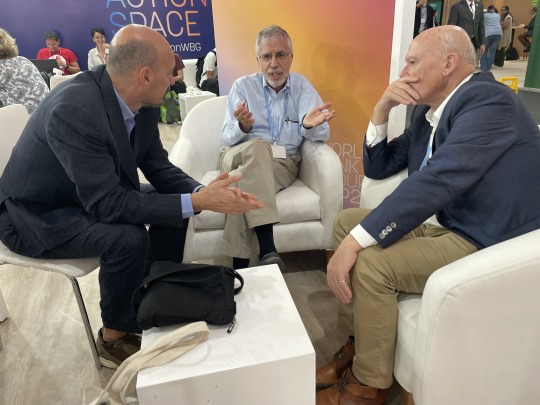
Prof. Stavins meeting with Simone Borghesi, Director, FSR Climate; and Prof. Jos Delbeke, EIB Chair on Climate Policy and International Carbon Markets, European University Institute at COP27. 11/15/2022
#COP27#COP-27#Climate Change Conference#ClimateConference#climate policy#ClimateChangePolicy#Environmental Economics
0 notes
Text
BOYCOTT COP28

As with everything in the UAE, COP28 is a mirage of green washing. Getting there by plane - the top polluting industry, made worse by private jets, is only the beginning of the paradox of attending. The tourism industry, heavily reliant there on air conditioning, releases GHGs by the tons, food waste and a proliferation of plastics. The ambient air is often at 150 on the AQI, where elsewhere normal levels are at 25. Next is the use of Israeli lobby firms to help the UAE with its human rights record in Europe where EU politicians are allegedly bribed in Red Crescent envelopes, which still conveniently leaves out the sex trade (Porta Potty) and degradation of women albeit - as is always the excuse, renumerated handsomely (for dressing as nuns ripping bibles mid-sex!). Yes, employing human rights offenders to combat its image as human rights abuser is as cynical as the UAE leadership is. But getting at the heart of abuses is what Little Sparta has accomplished in Yemen, Libya, Tunisia, Sudan, and elsewhere with mercenaries like the Wagner group or with UAE-based nutjob Erik Prince. Muslims killed, starved or displaced by the thousands if not millions to the glory of a leader whose protection is guaranteed by London, UK for services rendered to the (non-Muslim) monarchy by its repression and persecution of all things Arab Spring and democracy... couched in "anti-terrorism". Of course 🙄. This is the place that jailed Jamal Khashoggi's lawyer for "insulting the state" and lured & kidnapped the Hotel Rwanda hero recently released. Its judicial system is at the whim of its leaders. Fast forwarding to the UAE's planned fossil fuel expansion by 2050 and the Paris Accord may as well go to Dubai to die in December 2023.
#boycott cop28#uae#mbz#climate change#united nations#gold mafia#antonio guterres#climate conference#israeli occupation#human rights#israeli apartheid#greta thunberg#palestine#palestinians#illegal settlements#shireen abu akleh#free palestine#cop28#expo2020#dubai#fazza#princess haya#sheikha latifa#jamal khashoggi#wagner group#mercenaries#gold#sudan#ukraine#muslim
14 notes
·
View notes
Text

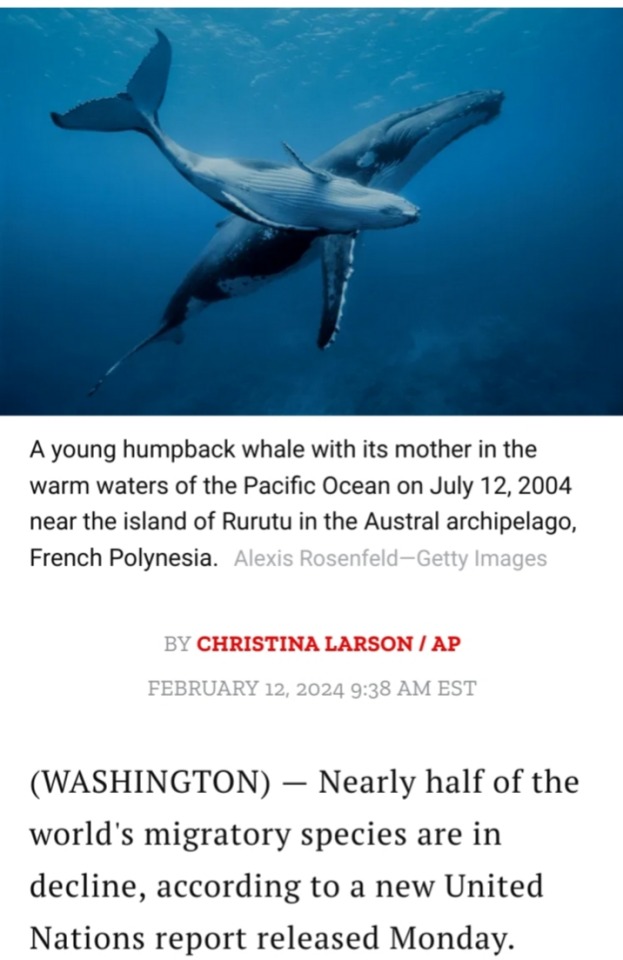
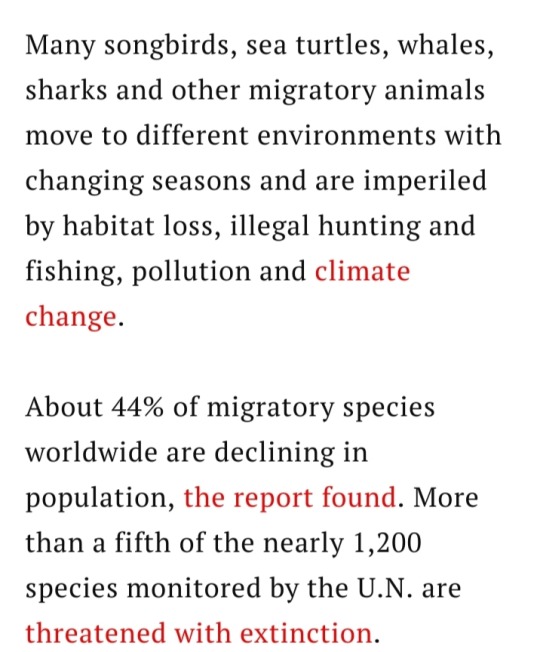
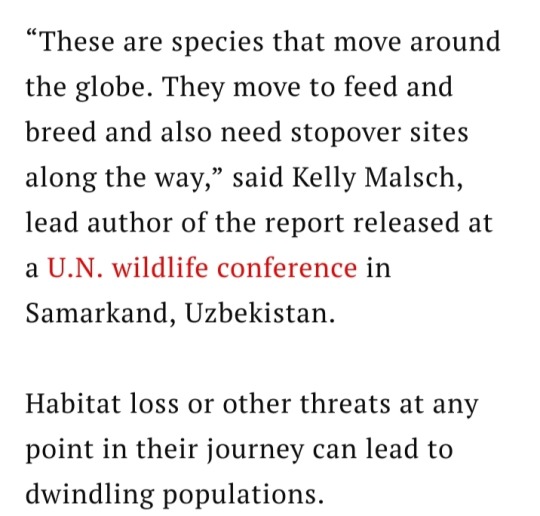


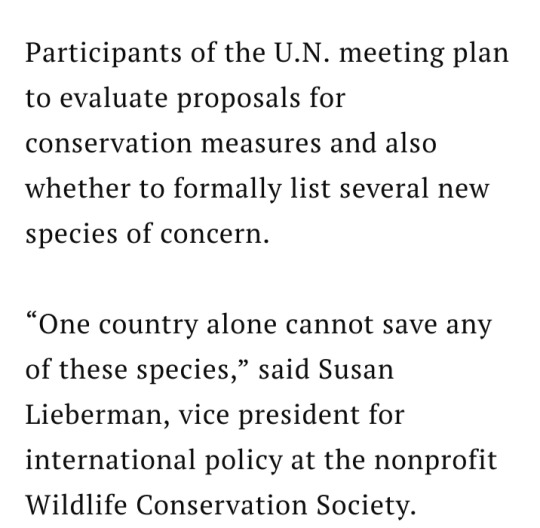



#United Nations#migratory species#wildlife conservation#climate change#habitat loss#pollution#illegal hunting#illegal fishing#International Union for Conservation of Nature's Red List#Wildlife Conservation Society#U.N. Biodiversity Conference#Amazon River#conservation#wildlife#UN Convention on the Conservation of Migratory Species of Wild Animals (CMS)
2 notes
·
View notes
Text
youtube
Environmental activist Xiye Bastida discusses her experiences so far at COP27 in Sharm el-Sheikh, Egypt, pointing out the differences between the experiences activists in the Global North and Global South are having with the climate movement. The UN Climate Change Conference is bringing together activists, politicians, and organizations from all over the world to tackle the climate crisis.
This video was created in collaboration with Nature's Newsroom.
#Earth #Environment #ClimateCrisis #NowThis
#now this earth#now this#solarpunk#Xiye Bastida#Environmental activist#climate activst#COP27#sharm el sheikh#Sharm el-Sheikh#egypt#Global North#global south#UN Climate Change Conference#activist#activism#climate crisis#climate chaos#climate change#Youtube
23 notes
·
View notes
Text
A dying plant inside an ornate box is the perfect metaphor for COP27

(Source)
14 notes
·
View notes
